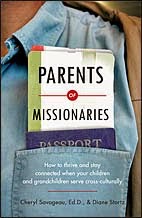
“Every time there’s transition, there is loss. So when people are feeling strange about their situation I ask them, ‘What did you lose?’ Because where there’s loss, there’s grief.” —Ruth Van Reken, author of Third Culture Kids
The losses involved with cross-cultural transitions are many, and not all will be voiced as simple answers to the question “What do you miss the most?” They include relationships, dreams, purpose, status, identity, and some things that defy labels.
When someone is grieving a loss—whether of a loved one or of opportunities or of “home”—we tend to search for something to say rather than for a chance to listen. And when we speak, we too often don’t invite the person to express her sadness. Instead, we say what we hope will make the grief go away.
Why are we so uncomfortable with grief? Of course, we don’t like for our friends to be sad, but how often does our discomfort also come from not wanting to be around sad people?
At the risk of being hypocritical, I’ve made a list of things that I don’t like to hear when I’m sad and hurting. I’m afraid that I’ve said most of them myself and probably will continue to do so from time to time. But I’m trying to listen more and talk less. I’m trying to allow grief to run its course in others and not try to make it go away so that I can get on with life.
I need to give credit to a small book, A Friend in Grief: Simple Ways to Help, for it’s inspiration and validation. At just over 100 pages, this guide by Ginny Callaway is full of practical advice for what to say and what not to say, for what to do and what not to do when helping a grieving friend. From her own experience—Callaway’s ten-year-old daughter died in a car accident—and from talking with others, Callaway knows what she’s writing about. Even though the subject of her book is grief caused by the death of a loved one, her advice is valuable for dealing with people grieving other losses as well.
You may not agree with my list. Some items may seem rather picky, and some may be the things that in fact cheer you up. But if I do nothing else, I’d like to initiate an inner conversation on how our words may sound, even if they come from the best of intentions.
10 Things I’d Rather Not Hear . . . and Shouldn’t Say:
1 – I know how you feel.
(This was first on Callaway’s list, too.)
We don’t know exactly how others feel, and even if we’ve gone through something similar, it’s only similar, not exactly the same. We don’t know everything from a person’s past that has culminated in the present emotions. “I know how you feel” doesn’t invite much further sharing. You might try saying something like, “I know a little of what you’re going through,” that is, if it’s true.
“I know how you feel” often leads to . . .
2 – Let me tell you what happened to me.
This is not a time to one-up someone. We shouldn’t invalidate others’ experiences or their emotions. Maybe my friend moved three times in a year. Telling her that I’ve moved six times says, “Compared to me, you don’t have the right to feel sad.” This phrase is a close cousin to “We all have our problems.”
3 – Do you mind if I take this call?
When we’re having deep, important conversations with others, a you’re-important-enough-to-me-that-I’ve-set-aside-this-time-for-you talk, we shouldn’t even have our phones out, ringing, beeping, or buzzing. Just being able to see a cell phone during a conversation distracts from building relationships. We shouldn’t acknowledge a ring unless it’s to silence the phone. And we shouldn’t answer our phones unless we’re on call for an emergency situation. It’s not always possible to escape distractions, but that means we need to do a better job of choosing our times and places.
4 – Everything happens for a reason. (It’s all part of God’s plan. It wasn’t meant to be.)
I actually don’t believe this to be true. Maybe you do. Either way, it’s not a cure-all that makes the pain go away, even though that’s often how it’s used. It’s become something that too many people say with little thought to the theology behind it. This often sounds like “Why are you sad? This is the way it’s supposed to be.” But if the things that have occurred happen not to feel like good things, then remember . . .
5 – When one door closes, another one opens.
A more spiritualized version of this is “When God closes a door, he opens a window.” I haven’t figured out which chapter of the Bible this verse comes from. It’s one of the many platitudes that people say to make everything OK. Feel-good sayings tell the listener just that: “Feel good.” They are often used to tie problems up in a bow and to do the same for many a conversation: Now that we’ve solved that problem, we can talk about something else.
6 – Let me know if you need anything.
Many people who are huting emotionally feel as if they’re burdening others and can be embarrassed by how needy they’ve become. Saying “Let me know if you need anything” puts the ball in their court to ask for help. And even though we’ve made the offer sincerely, when someone considers sharing a need, it’s very easy for him to feel as if he’s imposing. Instead, we should continue to ask what his needs are . . . and also help without an invitation.
7 – It could be worse. (You have so much to be thankful for.)
Of course it could be worse. But that’s not the point. It’s bad enough. Words saying that a person’s problems don’t deserve the grief being expressed can lead that person to hide his sorrow, convinced that his feelings aren’t justified. Hidden sorrow doesn’t go away, it just shows up later as unexplained despair, anger, physical ailments, and the like.
8 – You need to move on.
It’s no fun to be stuck in a difficult place, but that place may seem like the only option. When the routines of the past are gone, and the future is frighteningly unsettled, what does progress look like? It’s not simply putting on a smile so that others feel more comfortable.
9 – I want the old you back.
There’s a good chance the grieving person wants her old self back, too. It may seem as if the grief is the cause of the change, but often, one of the losses that the person is grieving is the loss of the person she used to be. That loss wasn’t chosen. It wasn’t planned, expected, or wanted. And coming “home” doesn’t mean the changes will automatically go away.
And last, but not least . . .
10 – This is just a season.
Doesn’t it seem that for Christians every period of time has become a “season”? When people tell me that my difficulties are only a season, I hear them say that they will end soon, and spring is around the corner. How do they know? What if my winter lasts for 8 years? Why don’t we call the good times “just a season”?
I Need to Listen with Grace, Too
Now that I’ve gotten all that off my chest, I’ll step down off my rickety soapbox and look at things from another angle. As a sometime recipient of the words above, I also understand that I need to receive with grace my friends’ efforts—even when I’m hurting. I need better to hear their concern even when the words don’t feel right.
Missionary Rachel Marie Stone and her fellow authors address this in their Christianity Today article, “Go Ahead, Say the Wrong Thing.” She writes that “listicles” of “things you should never say” are all the rage but often misguided.
I’ll stand by my list, but I’ll also take her point to heart:
Just before I returned from a very difficult time as a mission worker in sub-Saharan Africa, I talked to my therapist on Skype. She’d been a mission worker herself, and understood my anxiety:
“I just can’t stand the thought of all the stupid things people at church might say to me about this experience,” I told her.
“But people will say stupid things,” she said kindly. “The question is, how will you receive those stupid remarks?”
It seemed to me then that my own sense of the importance of right words did not necessitate my hair-trigger outrage at hearing “wrong” words. I could survive thoughtless remarks, choosing to hear, beneath them, the genuine concern and impulse to connect that underlies so much of our imperfect human communication.
When I’m helping, I’ll do my best not to say the wrong things. When I’m being helped, I’ll do my best to hear those best intentions.
(Peter Katona, “More and More Americans Consider Themselves ‘Hidden Immigrants,’” Columbia News Service, February 27, 2007; Ginny Callaway, A Friend in Grief: Simple Ways to Help, High Windy Press, 2011; Rachel Marie Stone, Megan Hill, and Gina Dalfonzo, “Go Ahead, Say the Wrong Thing,” Christianity Today, August 5, 2014)
[photo: “365 0127,” by Tim Caynes, used under a Creative Commons license]
 In 2012 I wrote “Can Grief and Joy Coexist?” In light of our own recent sadness, I’ve adapted it and posted it at A Life Overseas. Go there to read it all (and to hear the song at the end.)
In 2012 I wrote “Can Grief and Joy Coexist?” In light of our own recent sadness, I’ve adapted it and posted it at A Life Overseas. Go there to read it all (and to hear the song at the end.)





